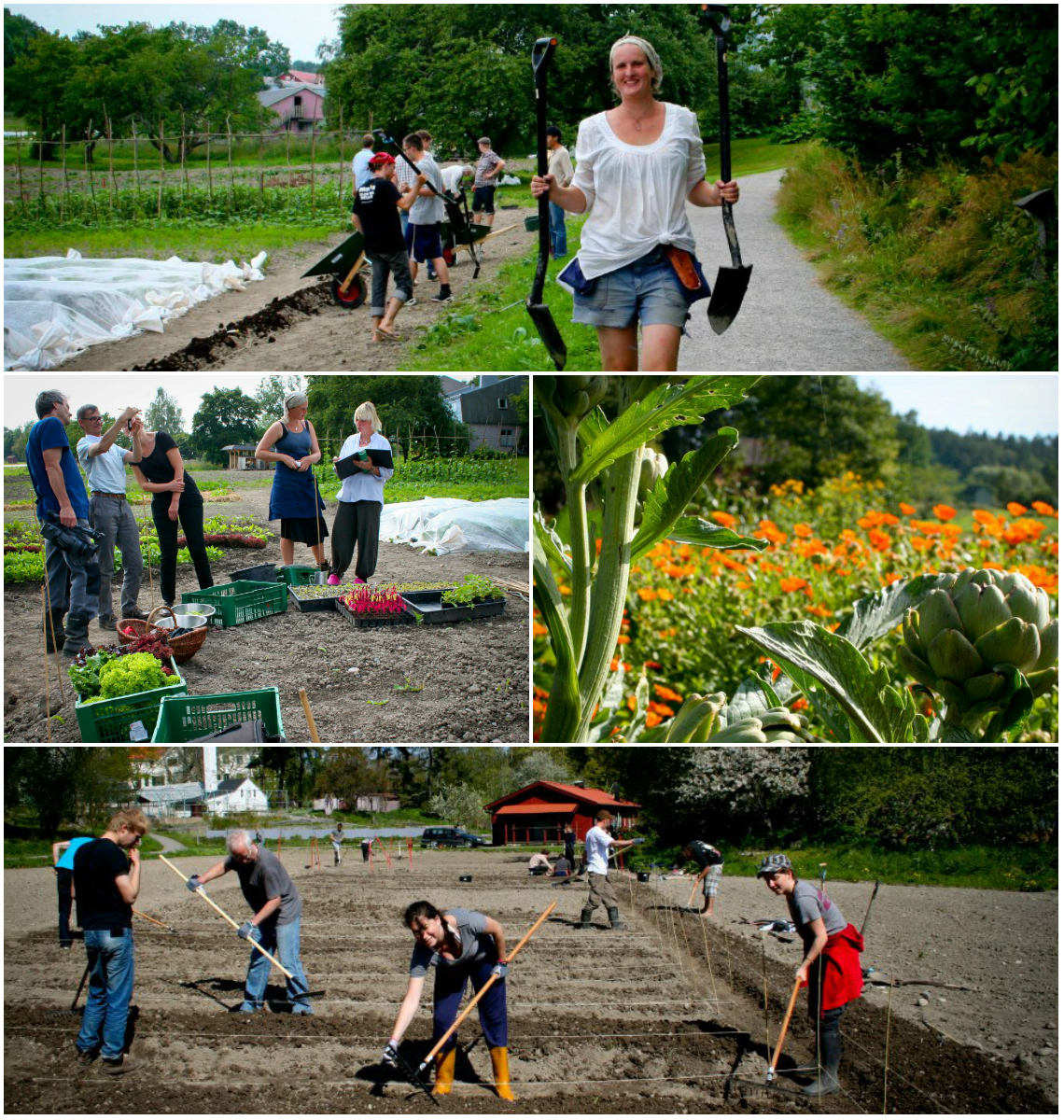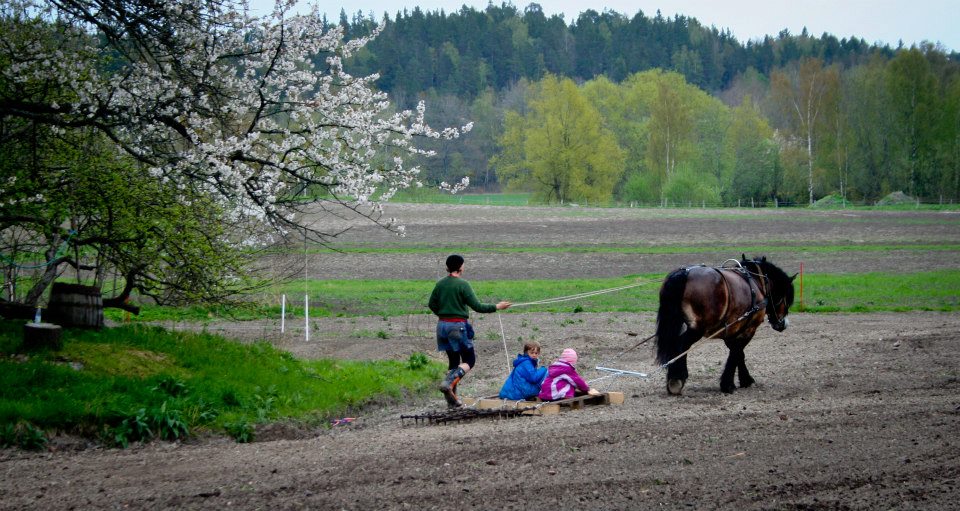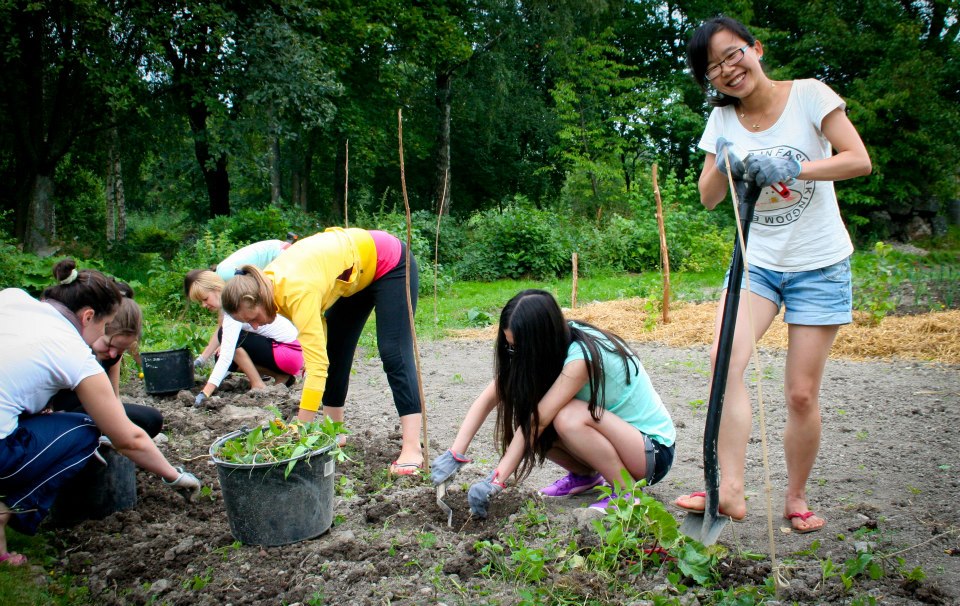 ‘Dina 2000 Kvadratmeter’ – Our version of Your 2000 square meters
‘Dina 2000 Kvadratmeter’ – Our version of Your 2000 square meters
The ‘Dina 2000 Kvadratmeter’ (‘Your 2000 square meters’) project creates a positive vision of how your own piece of farm land may look. On the field in Ytterjarna everything one person needs to eat during one year is cultivated. Practically and pedagogically the project shows that 2000 m² of arable land is enough for one person to live well on.
Each farm is unique and has its own individuality, in the same way that each human is unique. The landscape and soil type together with the farmer’s actions form the foundation of the farm’s individuality. When the farmer creates a balance between fodder, animals and manure, between giving and taking crops, between work and rest and between social interaction and inner reflection – then the farm’s individuality can build up the quality of the soil and have a positive effect on its surroundings. Here we produce a diet which is sufficient for one person during one year, without using imported fodder and chemical fertilizers. Not only that, we also reduce nutrient leakage into the Baltic Sea, increase animal welfare and actively support local and seasonal produce.
ERA, Ecological Recycling Agriculture
How to create a food production and consumption that doesn’t take more resources from the planet than it gives back is central for this project. The Your 2,000 square meters garden is cultivated according to ERA principles (Ecological Recycling Agriculture), a concept developed by two BERAS projects (Baltic Ecological Recycling Agriculture and Society, 2003-06 and 2010-13, which focused on combatting the eutrophication of Baltic Sea). What essentially distinguishes ERA farming from “regular” organic farming is the use of leys in crop rotation and self-sufficiency with fodder and manure.
Using crop rotation – the practice of growing different types of crops in the same area in sequential seasons – is a key element of ERA farming and vital to preserve the quality of the soil for coming generations. The use of a crop rotation allows the soil to regenerate itself after intensive periods. Most food crops suck nutrients out of the soil, so they are followed by grass and clover on the same patch to restore nutrients and soil structure. Also, where a balanced crop rotation is used, weeds and pests will not flourish.
In this garden we use a 12-year crop rotation for vegetables and a 7-year crop rotation for grains.
The ley has an important function in the garden. It collects and harbors nutrients (such as nitrogen and phosphorus) as well as carbon and prevents them from leaking into the sea (or to the air). It also builds up humus in the soil, which is vital for the soil to be fertile for a long period of time. Also, of course, the ley provides food for the animals.
ERA farming helps reducing the eutrophication of the Baltic Sea and also has positive impacts on climate change. In the Your 2,000 square meters garden, about 20% of the land is used for vegetables, 30% for grains and 50% for ley.
School garden and center of expertise
Your 2,000 square meters has been developed during 2012 and 2013 for several different purposes and target groups.
- It is a garden that is run professionally according to ERA principles, and thereby showcases the strengths and possibilities of the ERA concept when it comes to reducing the eutrophication of the Baltic Sea and combatting climate change.
- It serves as a pedagogical school garden where teachers and students learn about agriculture, sustainability, food and the environment.
- It is an integral part of the local food cluster known as Södertälje Sustainable Food Society – another concept developed by the BERAS projects – which focuses on creating local and sustainable food chains.
- It is a visiting destination. It is located in a beautiful garden in Ytterjärna, Sweden and attracts visitors from the region as well as the rest of Sweden and abroad.
- It is an arena for workshops, seminars, guided tours and public events.
- It is an arena for opinion forming activities related to the eutrophication of the Baltic Sea and environmental issues.
- It is a place for social development where trainees, volunteers and others are welcome to contribute to the work in the garden.
Our aim is to create a platform for students, teachers, decision makers, researchers, farmers, gardeners, entrepreneurs and others, providing know-how and inspiration of a sustainable agriculture and food production that does not damage the Baltic Sea. We also want to inspire others to create their own versions of Your 2000 square meters in other parts of Sweden and abroad.
Your 2000 square meters is part of the project Södertälje Sustainable Food Society, which is supported by BERAS Implementation, LEADER Södertälje Landsbygd and Stockholm City Council. It ends on March 1st 2014 and will thereafter be a part of BERAS International, a foundation and international network focusing on achieving sustainable development by promoting an ecological recycling agriculture, more local food production and environmentally friendly food habits.For further information about the project visit 2000m2.se



